|
|
|
|
 CHAPTER 18
CHAPTER 18The ship is finished—The births of Jacob and Joseph are mentioned— The company embarks for the promised land—The sons of Ishmael and their wives join in revelry and rebellion—Nephi is bound, and the ship is driven back by a terrible tempest—Nephi is freed, and by his prayer the storm ceases—They arrive in the promised land. [About 590—589 B.C.] |
Lehi's company enters the finish sailing ship and disembarks from their first land of Bountiful—Rebellion and Nephi bound the stress of the storm and circumstances prohibits Sariah from caring for her little children, Jacob and Joseph—Nephi loosed and Liahona again works—Ship arrives at the second land of Bountiful in the promised land—tempory settlement, planting and harvest—Journies in the wilderness finds animals, ores and arrival at the Land of First Inheritance [About 580—579 B.C.] | |
|
1 AND it came to pass that they did aworship the
Lord, and did go forth with me; and we did work timbers of curious
bworkmanship. And the Lord did show me from time to time
after what manner I should work the timbers of the cship.
2 Now I, Nephi, did not work the timbers after the manner which was learned by men, neither did I build the ship after the manner of men; but I did build it after the manner which the Lord had shown unto me; wherefore, it was not after the manner of men. |
1a
1 Ne. 17:55 b TG Art c 1 Ne. 17:49 (8, 17, 49-51)
|
|
|
3 And I, Nephi, did go into the mount oft, and I did
apray oft unto the Lord; wherefore the Lord
bshowed unto me cgreat things.
4 And it came to pass that after I had finished the ship, according to the word of the Lord, my brethren beheld that it was good, and that the workmanship thereof was exceedingly fine; wherefore, they did ahumble themselves again before the Lord. 5 And it came to pass that the voice of the Lord came unto my father, that we should arise and go down into the ship. |
3a
Jer. 33:3 b TG Guidance, Divine c 2 Ne. 1:24 4a 1 Ne. 16:5
|
|
|
6 And it came to pass that on the morrow, after we had prepared all
things, much fruits and ameat from the wilderness, and
honey in abundance, and provisions according to that which the Lord had
commanded us, we did go down into the ship, with all our loading and our
bseeds, and whatsoever thing we had brought with us, every
one according to his age; wherefore, we did all go down into the
cship, with our wives and our children.
7 And now, my father had begat two sons in the wilderness; the elder was called aJacob and the younger bJoseph. 8 And it came to pass after we had all gone down into the ship, and had taken with us our provisions and things which had been commanded us, we did put forth into the asea and were driven forth before the wind towards the bpromised land.
|
6a
1 Ne. 17:2 b 1 Ne. 8:1; 1 Ne. 16:11 c Gen. 7:7 7a 2 Ne. 2:1 b 2 Ne. 3:1 8a Ps. 8:8; 2 Ne. 10:20 b 1 Ne. 2:20; 1 Ne. 5:5 (5, 22); TG Promised Lands
|
|
|
9 And after we had been adriven forth before the
wind for the space of many days, behold, my brethren and the sons of Ishmael
and also their wives began to make themselves merry, insomuch that they began
to dance, and to sing, and to speak with much brudeness,
yea, even that they did forget by what power they had
been brought thither; yea, they were lifted up unto exceeding
rudeness.
10 And I, Nephi, began to fear exceedingly lest the Lord should be angry with us, and smite us because of our iniquity, that we should be swallowed up in the depths of the sea; wherefore, I, Nephi, began to speak to them with much soberness; but behold they were aangry with me, saying: We will not that our younger brother shall be a bruler over usa. 11 And it came to pass that Laman and Lemuel did take me and abind me with cords, and they did treat me with much harshness; nevertheless, the Lord did suffer it that he might show forth his power, unto the fulfilling of his word which he had bspoken concerning the wicked. |
10a We will not that our younger brother
shall be a ruler over us This is the same attitude which had
prevailed with Cain and Abel and also with the 10 brothers of Joseph of Egypt
which they had against him which caused them to seek his life and
eventually sell him into Egypt. But God will whom he will to be his choosen
to rule and lead. And he choseth the righteous over the wicked though the
wicked do rebell against the Lord and his chosen lead in all times and in all
despensation. So it is with Joseph Smith and those 'elder' men who supposed
themselves his better and when they could not make themselves to be such, they
also did resolve upon that solution of seeking and taking his life.
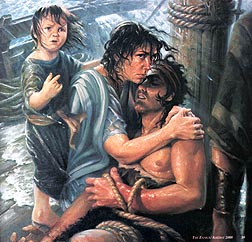 |
9a
Ether 6:5 b 2 Ne. 1:2; TG Rioting and Reveling 10a 1 Ne. 17:18 (17-55); 2 Ne. 4:13 (13-14) b Gen. 37:10 (9-11); 1 Ne. 16:37-38; 2 Ne. 1:25 (25-27) 11a 1 Ne. 7:16 (16-20) b Ex. 23:7; Ps. 37:9 (8-13); Alma 14:11
|
|
12 And it came to pass that after they had bound me insomuch that I
could not move, the acompass, which had been prepared of
the Lord, did cease to work.
13 Wherefore, they knew not whither they should steer the ship, insomuch that there arose a great astorm, yea, a great and terrible tempest, and we were adriven back upon the waters for the space of three days; and they began to be frightened exceedingly lest they should be drowned in the sea; nevertheless they did not loose me. 14 And on the fourth day, which we had been driven back, the tempest began to be exceedingly sore. 15 And it came to pass that we were about to be swallowed up in the depths of the sea. And after we had been driven back upon the waters for the space of four days, my brethren began to asee that the judgments of God were upon them, and that they must perish save that they should repent of their iniquities; wherefore, they came unto me, and loosed the bands which were upon my wrist, and behold they had swollen exceedingly; and also mine ankles were much swollen, and great was the soreness thereof.
|
12a
1 Ne. 16:16 (10, 16, 26);
2 Ne. 5:12; Alma 37:38 (38-47); D&C 17:1 13a Jonah 1:4; Matt. 8:24 b Mosiah 1:17 15a Hel. 12:3
|
|
|
16 Nevertheless, I did look unto my God, and I did
apraise him all the day long; and I did not murmur against
the Lord because of mine afflictions.
17 Now my father, Lehi, had said many things unto them, and also unto the sons of aIshmael; but, behold, they did breathe out much threatenings against anyone that should speak for me; and my parents being bstricken in years, and having csuffered much grief because of their dchildren, they were brought down, yea, even upon their sick-beds. 18 Because of their grief and much sorrow, and the iniquity of my brethren, they were brought near even to be carried out of this time to meet their God; yea, their agrey hairs were about to be brought down to lie low in the dust; yea, even they were near to be cast with sorrow into a watery grave. 19 And Jacob and Joseph also, being young, having need of much nourishment, were grieved because of the afflictions of their mother; and also amy wife with her tears and prayers, and also my children, did not soften the hearts of my brethren that they would loose me.
|
16a
Ezra 3:11 (11-13);
2 Ne. 9:49; Mosiah 2:20 (20-21); Alma 36:28; D&C 136:28 17a 1 Ne. 7:4 (4-20); b Gen. 24:1 c TG Suffering d TG Family, Children, Duties of; TG Honoring Father and Mother 18a Gen. 42:38 19a 1 Ne. 7:19; 1 Ne. 16:7;
|
|
|
20 And there was nothing save it were the power of God, which
threatened them with destruction, could soften their
ahearts; wherefore, when they saw that they were about to
be swallowed up in the depths of the sea they repented of the thing which
they had done, insomuch that they loosed me.
21 And it came to pass after they had loosed me, behold, I took the compass, and it did work whither I desired it. And it came to pass that I prayed unto the Lord; and after I had aprayed the winds did cease, and the storm did cease, and there was a great calm.  22 And it came to pass that I, Nephi, did guide the ship, that we sailed again towards the promised land.
|
20a
TG
Hardheartedness 21a Jonah 1:6
|
|
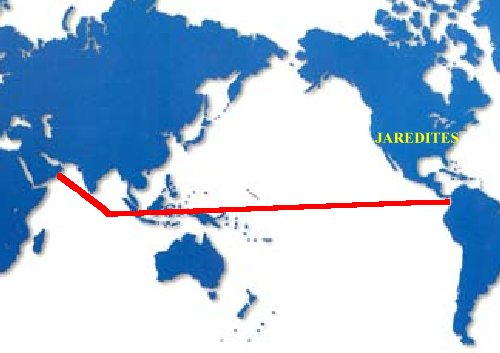 |
"When we read in the Book of Mormon that Jared and his brother came on to this
continent from the confusion and scattering at the Tower, and lived here more
than a thousand years, and covered the whole continent from sea to sea, with
towns and cities; and that Lehi went down by the Red Sea to the great
Southern Ocean, and crossed over to this land, and landed a little south of
the Isthmus of Darien, and improved the country according to the word of the
Lord, as a branch of the house of Israel, ..." (TPJS p. 267) Darien: most southern province of Panama bordering Colombia. |
|
|
23 And it came to pass that after we had sailed for the space
of many daysa **we did
aarrive at the
apromised land; and we went forth upon the land, and did
pitch our tents; and we did call it the promised land.
 the Istmus of Darien |
23a after we had sailed for the space of
many days This space of many days is that which extends from the
site of the great storm in the midst of the Ocean which did drive them first
of all back for 3 to 4 days before Nephi was loosed. The proposed event
and sight of this event is along the equator on the western side of the
Pacific where in an El Nino year the waters have stacked up upon the western
side of the Pacific and a stormy seas can rage at that point from the effects
of the El Nino and push ships back westward from the effects of the stacking
up of the waters. From that site, in certain El Nino years, the normally
westward flowing currents can turn about and flow directly east into the
central coasts of the Americas and enable an Isthmus landing, providing a
direct sailing route from the western pacific directly into the Isthmus of
Darien which is not otherwise there to be obtained.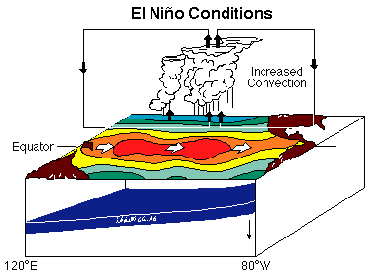 (Right mouse click & view image) |
23*
[Probably about 589 B.C.] * [About 579 B.C.] a Alma 22:30 (29-32) a Mosiah 10:13; TG Promised Lands;
One needs to understand that from the end of verse 29 to the beginning of verse 34 the verses between (30-33) have as their central topic of discussion Bountiful. Bountiful was on the 'wilderness (Hermounts) side on the north' of the land southward. Bountiful, on its northern side, bordered upon the land they called Desolation where the people of Zarahemla discovered dryed bones upon the earth. Bountiful was Lehi's site of first landing. From Bountiful, Lehi's company came up into the south wilderness as they journeyed finding animals and ores of every kind until the came to their Land of First Inheritence. Bountiful was that wilderness which was filled with all manner of wild beasts which had come from the land northward for want of food. The along the border line between the Land Bountiul and the Land Desolation from the east to the west sea is a day and a half's journey for a Nephite at the small neck of land which Bountiful extends up into. The Nephites had inhabited the land Bountiful at the date of Alma 22, from the east unto the west sea. This coast to coast habitation of the land Bountiful did hem in the Lamanites on the south from taking possession of the land northward. |
|
24 And it came to pass that we did begin to till the earth, and
we began to plant seedsa; yea, we
did put all our aseeds into
the earth, which we had brought from the land of Jerusalem. And it came to
pass that they did grow exceedingly; wherefore, we were blessed in abundance.
of Bountiful "Upon arriving at both lands of Bountiful, did Laman and Lemuel really think that such good navigating was mere happenstance? ... " ~ Neal A. Maxwell, October 2, 1999, LDS Conference. |
24a we did begin to till the earth, and
we began to plant seeds Whether this was a patern which the Lehi
group did follow as they traveled those 8 plus years in the wilderness in the
'more fertile parts of the land' or whether this was just the unique patern
upon their arrival in the land of promise, it is of interest that the first
item of activity for survival which was recorded is that of planting and
harvesting food. Hunting was not even mentioned and the animals about were
not particularly mentioned until Lehi's group once again began to 'journey in
the land'.
|
24a
1 Ne. 8:1;
1 Ne.
16:11
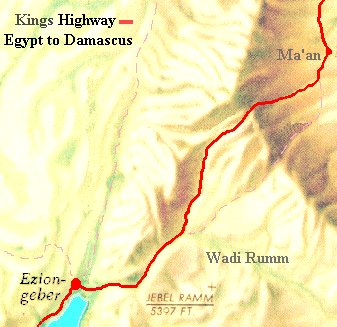 |
|
25 And it came to pass that we did find upon the land of promise,
as we journeyed in the
wildernessa, that there were
aabeasts in
the forests of every kind, both the cow and the ox, and the ass and the horse,
and the goat and the wild goat, and all manner of wild animals, which were
for the use of men. And we did find all manner of bore,
both of cgold, and of silver, and of copper.
|
25a as we journeyed in the wilderness Now some will teach that Lehi, who was born about 640 B.C. was now in about 590-580 B.C., now in his sixties, was just too old to continue to travel any further than the immediate area of their ship's landing. That is a matter of 'subjective opinion' and is not founded in the scriptures. Mormon, who was born about 310 A.D. was leading the armies of the Nephites in his seveties, fighting at the hill of Cumorah at the date of about 385 A.D., and lived to fight in later battles after that final great battle of Cumorah according to the record of Moroni. What the scriptural record clearly states is that the 'DID' journey in the wilderness of the land of promise and over the course of those journeys they discovered animals and beast of every king and also all manner of ore deposits including deposits of gold, silver and copper. Any one who has prospected for ore will appreciate that this type of journeying would have covered some sizable distances. But we have it all summarized into just one verse in Nephi's small plates abridgement of his own records. Now Nephi continues on to explain why this was but unfortunately those explaining verses have been divided from this verse and placed in the next chapter, thus distancing them from this single sentence which comprises verse 25 of chapter 18. |
25a
Enos 1:21 a Alma 2:37, Alma 22:31 b 2 Ne. 5:15 (14-16) c Deut. 33:16 (13-17)
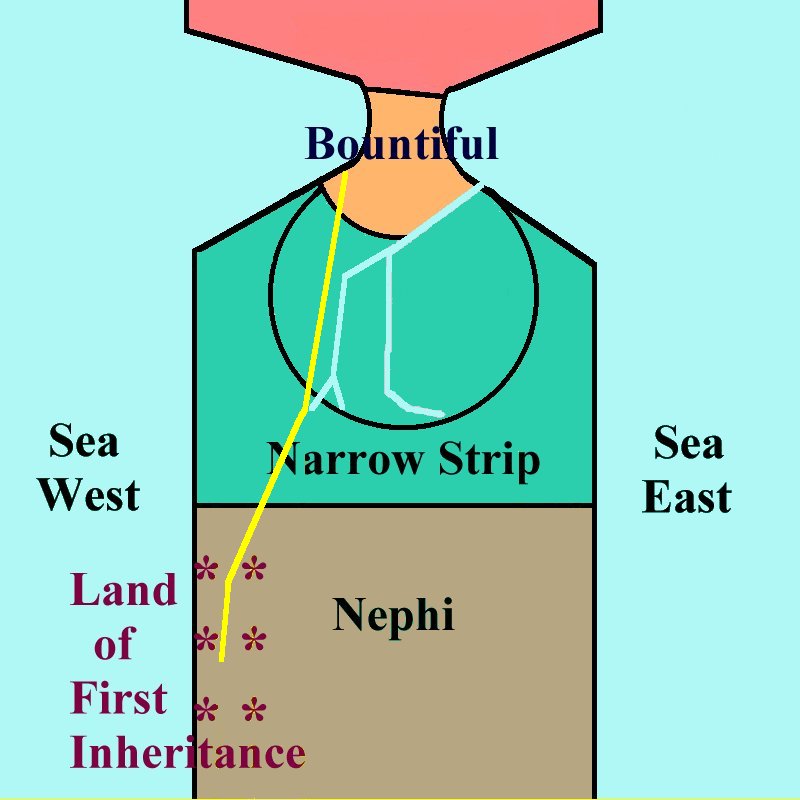 The second parallel river beyond the known and stated Sidon river will be developed logically out of other Book of Mormon references such as Alma's Missionary journeys, Lehi's lost expedition and the Lamanite attack upoon Ammonihah and other such contributing logical evidences. |
|
|
 |
|
